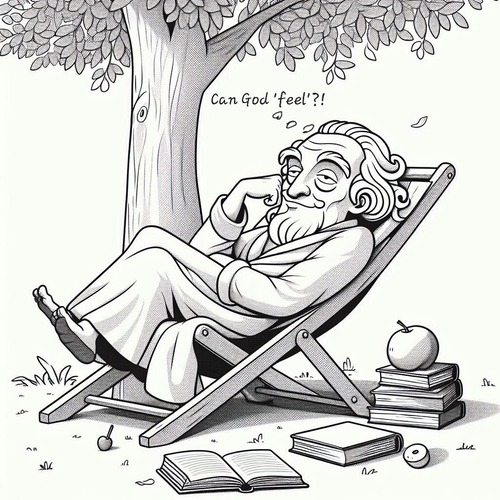Can God ‘Feel’? Harmonising Impassibility with Divine Emotion
If you’ve spent any time reading the Bible, you’ve encountered passages that speak of God’s love, anger, jealousy, and compassion. Yet in theological discussions, particularly in Reformed circles, you’ll also hear about God’s “impassibility”—the teaching that God cannot be acted upon or affected by anything outside Himself. This raises an obvious question: How can an impassible God experience emotions? In other words, Can God Feel?
The apparent contradiction has troubled many Christians and has even led some modern theologians to abandon the doctrine of divine impassibility altogether. But is this necessary? The Reformed tradition offers a robust framework that maintains both God’s impassibility and the reality of divine emotion. Let’s explore how these concepts harmonise rather than conflict.
WHAT DIVINE IMPASSIBILITY REALLY MEANS
When Reformed theologians speak of God’s impassibility, they’re not suggesting God is emotionless or indifferent. Rather, impassibility means God is not passive in His emotional life. Unlike us, whose emotions are often reactive responses to external circumstances beyond our control, God’s emotional expressions flow from His unchanging nature and sovereign will.
The early church fathers and Reformed theologians distinguished between “passions” (involuntary emotional reactions) and “affections” (voluntary expressions of an unchanging nature). As Francis Turretin (1623-1687), one of the most precise Reformed theologians, explained:
“The affections which are ascribed to God in Scripture do not argue any passion in him (which would imply imperfection), but only an effect together with the relation to the object. Thus when God is said to be angry, to grieve, or to repent, there is no change in him, but only a change in his work proceeding from his immutable will.”
This distinction preserves God’s self-sufficiency while allowing for genuine divine emotional expression.
CAN GOD FEEL? THE BIBLICAL WITNESS
Scripture unquestionably portrays God as having a rich emotional life:
- God loves His people (John 3:16; 1 John 4:8)
- God experiences anger toward sin (Psalm 7:11; Romans 1:18)
- God expresses jealousy for His people’s devotion (Exodus 20:5; Zechariah 8:2)
- God shows compassion toward the suffering (Psalm 103:13; Isaiah 49:15)
These aren’t merely anthropomorphic figures of speech that we should dismiss as accommodation to human understanding. They reveal something true about God’s relationship with His creation, even if they don’t tell us everything about how God experiences these realities.
John Calvin (1509-1564) recognised this “accommodation” but insisted it conveyed genuine truth about God: “For who even of slight intelligence does not understand that, as nurses commonly do with infants, God is wont in a measure to ‘lisp’ in speaking to us? Thus such forms of speaking do not so much express clearly what God is like as accommodate the knowledge of him to our slight capacity.”
THE REFORMED SYNTHESIS: ACTIVE AFFECTIONS, NOT PASSIVE PASSIONS
The Reformed tradition doesn’t deny God’s emotions but reframes our understanding of them. God’s emotions are:
- Active, not reactive: They originate from within God’s own being, not as responses to external stimuli
- Constant in nature, varied in expression: God’s love doesn’t increase or decrease, but its expression varies according to His purposes
- Perfect in harmony: Unlike human emotions which often conflict, God’s emotional expressions exist in perfect harmony with His attributes
- Sovereign in expression: God chooses how and when to express His affections according to His wise purposes
Herman Bavinck (1854-1921), the great Dutch Reformed theologian, captured this synthesis beautifully: “God’s virtues are not passive qualities but active perfections that he demonstrates in and through his works. God is love in that he communicates himself; he is righteous in that he maintains his covenant… All of God’s perfections are actively revealed in their time.”
WHY THIS MATTERS THEOLOGICALLY
The doctrine of divine impassibility has profound theological implications:
- It secures God’s transcendence: If God could be emotionally manipulated or overwhelmed like humans, He would be subject to His creation rather than sovereignly above it.
- It guarantees God’s faithfulness: A God whose emotional state fluctuates based on circumstances might change His mind about His promises. As contemporary Reformed theologian Paul Helm argues, divine impassibility “undergirds the reliability of God’s character and covenant commitments.”
- It preserves God’s perfect knowledge: God doesn’t “discover” reasons to be angry or pleased; He eternally knows all things and His emotional expressions accord with this perfect knowledge.
- It upholds God’s self-sufficiency: God doesn’t need creation to fulfil emotional needs. John Frame (b. 1939) explains: “God’s impassibility means not that he is unfeeling, but that his feelings are not like ours in the important sense that they are never responses to forces outside himself. That is, they are never passions.”
FINDING COMFORT IN AN IMPASSIBLE YET EMOTIONAL GOD
Far from being a cold philosophical concept, divine impassibility offers profound comfort:
- God is never overwhelmed by our suffering: He can help us in our pain because He is not overcome by it
- God’s love doesn’t fluctuate: His affection for His people isn’t based on their performance but on His unchanging nature
- God’s anger against sin is perfect: His opposition to evil isn’t a knee-jerk reaction but flows from His holy character
- God’s compassion is reliable: We can trust that God’s mercy isn’t capricious or temperamental
As K Scott Oliphint, professor of apologetics at Westminster Theological Seminary, notes in his work on God’s covenantal condescension, the doctrine of impassibility actually enhances our understanding of God’s love and commitment to His people:
“God’s condescension to us in covenant…allows for the reality and truth of biblical language ascribing emotions to God, while at the same time maintaining the essential impassibility of God’s character.”
CONCLUSION: THE GLORY OF AN IMPASSIBLE GOD WHO ‘FEELS’
The Reformed tradition doesn’t force us to choose between a cold, emotionless deity and a God who is swept away by His feelings. Instead, it presents the glorious reality of a God whose emotional expressions flow perfectly from His unchanging nature.
God genuinely loves, hates sin, shows compassion, and expresses joy—not as one tossed about by shifting circumstances, but as the sovereign Lord who perfectly expresses His character in relationship with His creation. This God—impassible yet emotionally expressive—is the God of Scripture and the God worthy of our worship.
In the beautiful tension between divine impassibility and divine emotion, we discover a God who is greater than our limited understanding yet close enough to genuinely engage with us in relationship. That’s the wonder of the God revealed in Scripture and faithfully proclaimed in the Reformed tradition.
CAN GOD FEEL? RELATED FAQs
Did the early Reformers like Luther and Calvin fully embrace the doctrine of divine impassibility? Yes, both Luther and Calvin affirmed divine impassibility, though with different emphases. Luther sometimes used more emotionally charged language about God, while Calvin more systematically developed the concept of divine accommodation. Both maintained the fundamental belief that God’s nature is unchanging, even as they emphasised God’s genuine engagement with humanity through Christ.
How does Christ’s suffering on the cross relate to divine impassibility? In the Reformed understanding, Christ suffered in His human nature, not in His divine nature. The doctrine of the hypostatic union (Christ’s two natures in one person) allows us to affirm both that God experienced human suffering through the incarnation and that God’s divine nature remained impassible. This mystery of the incarnation deepens rather than contradicts the doctrine of divine impassibility.
How do “open theists” challenge the doctrine of divine impassibility? Open theists argue divine impassibility makes God distant and unrelatable, suggesting instead that God experiences emotions reactively in response to human choices. They typically reject the classic distinction between passions and affections, claiming that genuine love requires vulnerability to being affected by others. Reformed theologians respond that this misunderstands both impassibility and the nature of perfect love in God.
How might divine impassibility help believers process tragedies and suffering? Divine impassibility assures us God is not overwhelmed or destabilised by evil and suffering, which means He remains in perfect control even amidst chaos. Rather than suggesting divine indifference, this doctrine guarantees that God’s response to our suffering comes from His perfect wisdom and unchanging character. God’s impassible yet compassionate nature means He can provide true comfort rather than merely sympathising with our pain.
Can we say God experiences grief or disappointment without compromising divine impassibility? Yes, properly understood, Scripture’s descriptions of divine grief or disappointment can be compatible with impassibility. God’s grief is not a surprise reaction that overcomes Him, but His holy and eternal disposition toward sin expressed in time. When God expresses disappointment, it reflects His unchanging moral standard encountering human failure, not an emotional let-down that changes His internal state. These divine expressions are real but flow from God’s character rather than being imposed upon Him.
CAN GOD FEEL? OUR RELATED POSTS
Editor's Pick

Do Christians Need Holy Shrines? Why the Reformed Answer Is No
Walk into a medieval cathedral and you'll encounter ornate shrines, gilded reliquaries, and designated "holy places" where pilgrims gather to [...]

I Want To Believe, But Can’t: What Do I Do?
"I want to believe in God. I really do. But I just can't seem to make it happen. I've tried [...]

BC 1446 or 1250: When Did the Exodus Really Happen?
WHY REFORMED SCHOLARS SUPPORT THE EARLY DATE Many a critic makes the claim: “Archaeology has disproven the biblical account [...]

Does God Know the Future? All of It, Perfectly?
Think about this: our prayers tell on us. Every time we ask God for something, we’re confessing—often without realising it—what [...]

Can Christian Couples Choose Permanent Birth Control?
Consider Sarah, whose fourth pregnancy nearly killed her due to severe pre-eclampsia, leaving her hospitalised for months. Or David and [...]

Bone of My Bones: Why Eve Was Created From Adam’s Body
"This at last is bone of my bones and flesh of my flesh!" Adam's joyful exclamation upon first seeing Eve [...]

Is Calvinism Fatalism in Christian Disguise? Think Again
We hear the taunt every now and then: "Calvinism is just fatalism dressed up in Christian jargon." Critics argue Reformed [...]

Can Churches Conduct Same-Sex Weddings?
In an era of rapid cultural change, churches across America face mounting pressure to redefine their understanding of marriage. As [...]

Gender Reassignment: Can Christian Doctors Perform These Surgeries?
In the quiet of a clinic, a Christian physician faces a challenging ethical question. A patient sits across the desk, [...]

‘What Sorrow Awaits You Who Are Rich…’: What Does Jesus Mean?
The words hang in the air like a sword over comfortable Christianity: “What sorrow awaits you who are rich, for [...]
SUPPORT US:
Feel the Holy Spirit's gentle nudge to partner with us?
Donate Online:
Account Name: TRUTHS TO DIE FOR FOUNDATION
Account Number: 10243565459
Bank IFSC: IDFB0043391
Bank Name: IDFC FIRST BANK






